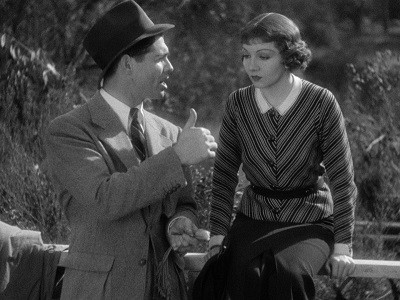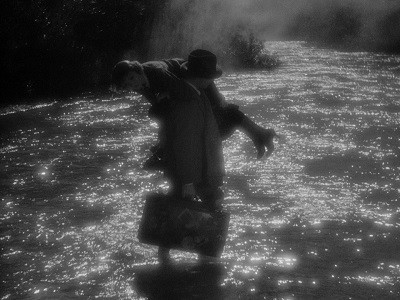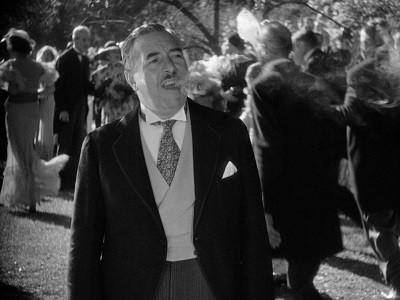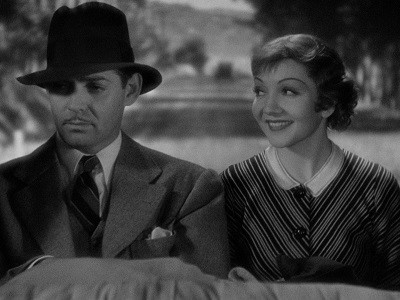| Reviews & Columns |
|
Reviews DVD TV on DVD Blu-ray 4K UHD International DVDs In Theaters Reviews by Studio Video Games Features Collector Series DVDs Easter Egg Database Interviews DVD Talk Radio Feature Articles Columns Anime Talk DVD Savant Horror DVDs The M.O.D. Squad Art House HD Talk Silent DVD
|
DVD Talk Forum |
|
|
| Resources |
|
DVD Price Search Customer Service #'s RCE Info Links |
|
Columns
|
|
|
It Happened One Night - The Criterion Collection
 When it comes to bestowing "classic" status on a film, two factors come to mind. The first is influence. Most of the greats introduce techniques and tricks that have been repeated for years, some so ubiquitous and second nature that modern viewers will have a hard time even sussing them out (the directorial style of Citizen Kane comes to mind). The second is longevity. Obviously, a film that endures in popularity decades after it was made must have something special going for it. It Happened One Night is a prime example of both, so much so that it's hard to believe both things could be true at the same time: it is the template that romantic comedies still follow today, its premise whittled down to its essence, and it is as funny and fresh now as it was in 1934, so much so that it puts many of those new films to shame.
When it comes to bestowing "classic" status on a film, two factors come to mind. The first is influence. Most of the greats introduce techniques and tricks that have been repeated for years, some so ubiquitous and second nature that modern viewers will have a hard time even sussing them out (the directorial style of Citizen Kane comes to mind). The second is longevity. Obviously, a film that endures in popularity decades after it was made must have something special going for it. It Happened One Night is a prime example of both, so much so that it's hard to believe both things could be true at the same time: it is the template that romantic comedies still follow today, its premise whittled down to its essence, and it is as funny and fresh now as it was in 1934, so much so that it puts many of those new films to shame.
The premise is as simple as they come: two people, a woman and a man, from different backgrounds and social classes, meet unexpectedly, and slowly fall in love. The woman is Ellie Andrews (Claudette Colbert), a wealthy heiress who is being pressured by her father, Alexander Andrews (Walter Connolly) to annul her marriage to a man he feels is a fraud, King Westley (Jameson Thomas). He's trapped her on the family yacht in order to try and talk some sense into her, but she dives overboard in order to escape. The man is Peter Warne (Clark Gable), a newspaper reporter who might be great if he could lose the ego and stop drinking. His editor, Gordon (Charles C. Wilson), has had enough, and fires him over the phone, a decision which does not affect Peter's decision to board a bus back home to New York. On the bus, he and Ellie are forced to share a seat at the back, and it's not long before he's figured out her identity and hatched himself a simple scheme: she'll give him the first-person account of her fight to be with the man she married, and he'll help her get to New York without getting caught, acting funny, or losing all of her dough.
The film was famously not one of Claudette Colbert's favorite experiences. She was the sixth actor director Frank Capra had offered the role to, and when he came to her, she only had four open weeks in which to make the movie, which necessitated that they would literally start shooting the next day. Still skeptical, she demanded twice her normal salary from the notoriously stingy studio head at Columbia, Harry Cohn, a request she expected would be denied. When he miraculously agreed, she complained throughout production, and remarked to a friend upon finishing that she'd just made "one of the worst pictures I've ever done." It's amazing, then, how wonderful she is in the movie, initially snappy and sarcastic, before warming up into playful and sweet, and then finally allowing herself to be overwhelmed with affection and emotion.  From beginning to end, she's got a slightly breathless, excited attitude, tapping into Ellie's exhilaration at being free for the first time, away from bodyguards and handlers and her father, all telling her how to act and think and feel. So much of the film's comic and romantic energy comes from her, it's hard to believe she was skeptical about making it.
From beginning to end, she's got a slightly breathless, excited attitude, tapping into Ellie's exhilaration at being free for the first time, away from bodyguards and handlers and her father, all telling her how to act and think and feel. So much of the film's comic and romantic energy comes from her, it's hard to believe she was skeptical about making it.
Given Colbert's energy, her co-star Clark Gable doesn't have to do much but stand in her way for the sparks to fly. First Peter ropes Ellie in, revealing that he knows her identity, then walks off in a huff when she offers him hush money. Once he's got her feeling a bit bad for him, he opens up a bit with some assistance, then reveals his game, with the convenient catch that if she says no to the story, he'll just turn her in. In a modern romantic comedy, the conflict between the two and slow road to attraction would be fairly straightforward, but Capra constantly mixes it up, giving this 80-year-old movie more nuance and invention than a frightening number of movies made using its playbook. They work together to fool some detectives on Ellie's trail, then he takes issue with the way she dunks her donut in her coffee. They laugh about his story to an inquisitive traveler (Roscoe Karns), then she cuts him down in the beloved hitchhiking scene, one of the most famous in comedy movie history. The viewer is instantly endeared to Ellie and Peter because they don't just have chemistry, they react to one another in a way that feels natural and fluid, dictated by each other's behavior rather than a book on screenwriting.
Although the clothes and cars have changed with the times, the dialogue and Capra's directorial style are so simple and straightforward that the film feels very contemporary. Many films from the era were shot mostly on sets and sound stages, but It Happened One Night is a real road picture, with the vast majority of the film clearly taking place out in the real world. In another famous scene, Peter carries Ellie across a river, and the obvious authenticity of the moment adds to its charm. When the film is confined to soundstages, Capra moves the camera, cutting in closer, frequently shifting angles, so that the artifice isn't as apparent. The structure of the film has also become part of the romantic comedy template, with a misunderstanding near the end of the film separating the two leads, but even this feels a bit more natural, stemming from the characters' understanding of one another, and the reality of their differing backgrounds providing a logical reason for them to remain apart. The film does have one strange quirk, in that it feels as if it's missing a scene right near the end of the film (possibly a necessity springing from Colbert's short shooting schedule). It's a testament to the strength of the characters that the film is fine without it, as warm, funny, and romantic as it was when it first premiered.
The Blu-ray
With Criterion back to separate Blu-ray and DVD releases, It Happened One Night arrives in their traditional Scanavo transparent Blu-ray case, featuring a famous black-and-white still of Colbert and Gable on opposite sides of the "walls of Jericho." As is often their norm, the rear cover consists entirely of box copy, with no pictures from the film, laid out in their standardized grid. On the reverse of the sleeve, an image of Gable and Colbert preparing to sleep in the hay shows through, and there is a fold-out pamphlet, as opposed to a traditional booklet, with an essay by New York film critic Farran Smith Nehme.
 The Video and Audio
The Video and Audio
In the liner notes for the Blu-ray, the comments about the film's new 4K digital restoration make note of the fact that two separate sources were used, a 35mm safety composite fine-grain print, and a 35mm nitrate print. During the course of this 1.33:1 1080p AVC-encoded transfer, the difference between the two prints is noticeable. For an example of the quality difference between the two sources, I have captured two frames from the same scene which appear to use the separate sources, which you can see here and here.
Putting aside the understandable fluctuation in quality when it comes to the two sources used, the vast majority of the transfer looks very nice -- I have used screencaptures from what is presumably the fine-grain safety for the embedded pictures because the quality of these shots is more representative of the video presentation as a whole. A minimal amount of detail has probably been lost to time, but as a whole, the restoration looks fantastic, free of scratches or damage. Film grain is readily evident, and although I never saw Sony's DVD version of it, I'm confident that Criterion's Blu-ray is a significant improvement, just based on the depth and overall clarity of the image. In dark scenes, detail is still evident and I spotted no crush or banding. There may be an occasional artifact in the lower-quality film footage, which is less naturally grainy and lends itself to compression errors, but any such issue is extremely minor and has more to do with the source than the production of the Blu-ray. Sound is an LPCM 1.0 mono track, which is generally free of distortion or softness, and although a word or two may be on the mushy side, the dialogue comes through with a satisfying degree of crispness. English captions for the deaf and hard of hearing are also included.
The Extras
Criterion has assembled a nice collection of supplemental features, both new and archival. The two key carryovers are an interview (11:16, upscaled HD) with Frank Capra, Jr. from 1999 on the making of It Happened One Night, and the feature-length documentary Frank Capra's American Dream (1:36:02, upscaled HD), a TV profile of the filmmaker directed by Kenneth Bowser and hosted / narrated by Ron Howard. The former was included on individual DVD releases of the film, and the latter was both released on a stand-alone DVD with The Matinee Idol, and included in Sony's 2006 The Premiere Frank Capra DVD box set. An original theatrical trailer is also included. (Skip to the bottom paragraph of the extras section for a bit more on archival extras.)
Three of the supplements are new to this release. The first is "Screwball Comedy?" (38:36, HD), a discussion between film critics Molly Haskell and Phillip Lopate about what the genre actually is, and whether or not It Happened One Night gave birth to it or not. Their chat starts by contextualizing the concept of Capra as a screwball filmmaker within the rest of his catalog, as well as comparing his style to the works of Howard Hawks and Ernst Lubitsch.  Afterward, they dive into a history of the production, while also analyzing the film. Their examples are highlighted with brief film clips to support their theories. It's a low-key but consistently engaging chat that sheds key light on the historical context in which the movie was made and released, with regard to Gable and Colbert's established screen personalities.
Afterward, they dive into a history of the production, while also analyzing the film. Their examples are highlighted with brief film clips to support their theories. It's a low-key but consistently engaging chat that sheds key light on the historical context in which the movie was made and released, with regard to Gable and Colbert's established screen personalities.
This is followed by Fultah Fisher's Boarding House (12:03, HD), the 1921 directorial debut of Frank Capra. This silent short film, presented with a new score by Donald Sosin, about the colorful sailors who take breaks between voyages at the boarding house in question, and the lady whose presence throws everything into disarray. It's got no connection to It Happened One Night aside from Capra's involvement, but it's a good short and worth a look.
The final "new" extra on the disc is "AFI's Life Achievement Award: A Tribute to Frank Capra" (59:11, upscaled HD), which as far as I can tell has not been included on any other Capra DVDs. Presented here is a "slightly edited" version of the entire televised ceremony, with a somewhat intrusive modern AFI logo bug in the bottom left-hand corner. Hosted by Jimmy Stewart, this is a warm and often very funny special honoring Capra, although of course it has all the tropes of a TV tribute special, including the more canned stories, the lengthy applause, the photo and clip montages, etc.
The one disappointment of the Blu-ray set is that three supplements from Sony's DVD releases were not ported over, two lengthy and one a fairly significant omission. The forgivable disappearances include an advertising still frame gallery, and an hour-long radio adaptation of It Happened One Night featuring Gable and Colbert reprising their roles -- supplements that would certainly have added to the value, but nothing essential. However, a feature-length audio commentary by Frank Capra Jr. is also missing in action, which is especially disappointing as his interview is pretty interesting. No explanation is given as to why some of Sony's supplements are included and some aren't, but it's a shame completists either can't sell their DVDs, or will have to pick one up to get everything.
Conclusion
Frank Capra's It Happened One Night didn't invent the romantic comedy, and it probably didn't invent the screwball comedy, either, but its influence is still felt today, not least of the reasons being the film itself holds up perfectly on the strength of the chemistry between its two leads and Capra's excellent sense of tone. Criterion's Blu-ray represents an imperfect upgrade from the DVD editions, but for Capra fans, it's an essential purchase, for the lengthy additional supplements, and the remastered feature presentation. Highly recommended.
Please check out my other DVDTalk DVD, Blu-ray and theatrical reviews and/or follow me on Twitter.
|
| Popular Reviews |
| Sponsored Links |
|
|
| Sponsored Links |
|
|
| Release List | Reviews | Shop | Newsletter | Forum | DVD Giveaways | Blu-Ray | Advertise |
|
Copyright 2024 DVDTalk.com All Rights Reserved. Legal Info, Privacy Policy, Terms of Use,
Manage Preferences,
Your Privacy Choices | |||||||













